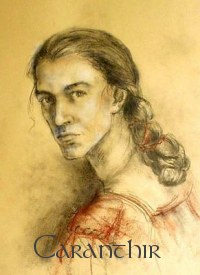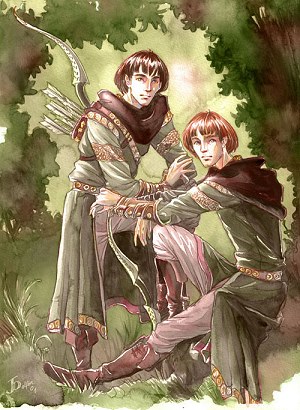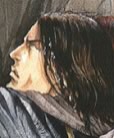The Sons of Fëanor
— (Fëanor’s character displayed in his sons)
Fëanor was born in Valinor, the son of Finwë and Míriel. Following the birth of Fëanor, his mother was spent. Saying to Finwë: ‘…strength that would have nourished the life of many has gone into Fëanor.’ (The Silmarillion, ch. 6) Thus she was released from life, for it had become a grief to her and her spirit departed to the Halls of Mandos. Following this, Finwë married again and had two more sons, Fingolfin and Finarfin; however Fëanor had no love for them. Fëanor means ‘spirit of fire’ and he was powerful in many areas – mind, craft and strength; his legacy, though filled with grief, reached to the Third Age. It was during the time he spent in Valinor that Fëanor created many things of craft, the greatest of these being the Silmarils. In these three jewels Fëanor had managed to capture the light of the Two Trees. During this time Melkor was released following his three ages of bondage. He began to spread rumours and whisperings amongst the Noldor, of rebellion against the Valar. Though being strong in mind, Fëanor heeded these whisperings and began to openly speak of rebellion, repeating the lies of Melkor that they had been forced to Aman so that Men could rule Middle-earth. Going to his father, Fingolfin told of these things to the King, and Fëanor, entering as they spoke, drew his sword on Fingolfin. For the drawing of the sword on a kinsman, Fëanor was banished from Tirion by the Valar for 12 years. Shortly following Fëanor’s release from banishment, Melkor stole the Silmarils, killed Finwë and with the help of Ungoliant destroyed the Two Trees.
In reaction to this, Fëanor marshalled the Noldor and they left the Valinor. Leading an attack on the Teleri elves, Fëanor stole their ships and led half the Noldor across to Middle-earth on these. He did, however, leave Fingolfin and those that followed him behind. These were then forced to make their way to Middle-earth by crossing the Helcaraxë.
Many of Fëanor’s actions were kept alive in memory largely due to the involvement of his sons in events that followed his death and the oath he swore was never forgotten. Each of Fëanor’s sons carried certain characteristics inherited from their Father, and though their Mother, Nerdanel (who longed to understand minds rather than master them) had passed on her gentleness and wisdom to some, she did not pass it on to all.
In the initial description of his sons, we can already see some of Fëanor’s physical characteristics. ‘He (Fëanor) was tall, and fair to face, and masterful, his eyes piercingly bright and his hair raven dark; in the pursuit of all his purposes eager and steadfast’ (The Silmarillion, ch 6). Of these attributes we can already see four shown in the initial description of his sons. ‘The seven sons of Fëanor were Maehdros the tall…; Celegorm the fair. And Caranthir the dark; Curufin the crafty…’(The Silmarillion, ch 5). Throughout the Silmarillion Tolkien kept, in a way, the character of Fëanor alive through his sons and their individual portrayals of their father.

Maedhros
Maedhros, the eldest, was masterful and had the strong leadership abilities of his father. This is shown in the way he dissuades his brothers from rash deeds and rebukes the harsh words of Caranthir. He makes peace with the house of Fingolfin and offers the Kingship of the Noldor to Fingolfin, saying ‘If there lay no grievance between us, lord, still the kingship would rightly come to you, the eldest here of the house of Finwë, and not the least wise.’ (The Silmarillion, ch 13). However this also shows that Maedhros is not like his father in his desire to rule. Due to drawing a sword on his half-brother, Fëanor was banished and told to remember ‘who and what’ he is. However, rather than do this, Fëanor becomes bitter toward the Valar and his brother. Finally, after his banishment, Fingolfin extends his hand saying ‘I remember no grievance’, but Fëanor merely looks at the hand and doesn’t even speak until Fingolfin says ‘Half brother in blood, full brother in heart will I be. Thou shalt lead and I will follow. May no new grief divide us.’ It is only at this point that Fëanor speaks, saying ‘So be it.’ This action in itself shows his desire to be in control and his lack of ability to see when he has done wrong or feel regret for it. We also see from these two events one of the underlying differences between Maedhros and Fëanor –their desires to rule.
Through Maedhros we see a blend of his father’s zeal coupled with his mother’s gentle wisdom, however, like all his brothers, he does not escape the oath that he swore. His wisdom and non-assuming manner hold Maedhros in good stead for many years. When winning small battles, he never takes it as a sign of Morgoth’s weakness but is rather ever watchful for the armies of Morgoth to come forth with revived strength. He also shows wisdom in allowing men to aid in the fight against the enemy. Though some of these prove treacherous, the wisdom is shown in the fact that he realised that the Noldor alone could not overthrow the gates of Thangorodrim. This is also unlike his father who ‘looking out from the slopes of Ered Wethrin with his last sight he beheld far off the peaks of Thangorodrim, mightiest of the towers of Middle-earth, and knew with the foreknowledge of death that no power of the Noldor would ever overthrow them.’ However despite this he still ‘laid it upon his sons to hold their oath and avenge their father.’ (The Silmarillion, ch 13)
Maedhros, like his father was a great warrior and had an enormous zeal for life, a fire that burned within. This is shown in his recovery from the torment of Morgoth ‘His body recovered from the torment and became hale, but the shadow of pain was in his heart; and he lived to wield a sword in his left hand more deadly than his right had been.’ (The Silmarillion, ch 13). And in the battle of Beleriand, ‘Maedhros did deeds of surpassing valour, and the orcs fled before his face; for since his torment upon Thangorodrim his spirit burned like a white fire within and he was as one that returns from the dead.’ (The Silmarillion, ch 1)
Maglor
Of all the brothers Maglor was the least like his father. He was patient and very much a follower of his elder brother Maedhros. Maglor was renowned for his singing and counted the greatest musician second only to Daeron of Doriath. The oath tormented him constantly and caused him to follow his brothers to fulfil their quest. However he expressed his grief for the havoc he had caused constantly through laments. By the end of the First Age he wished to be released from his oath, but Maehdros convinced him that this was not possible and Maglor ended his days singing sadly along the shores of the sea.
Caranthir

Caranthir was the ‘…harshest of the brothers and the most quick to anger…’ (The Silmarillion, ch 13). For the most part Caranthir received much of his father’s fiery passion and temper. He was swift to anger and as his father not easily persuaded through counsel. However he did obey the will of Maedhros but in his heart did not always agree. Though Maedhros made peace with the sons of Fingolfin and Finarfin, Caranthir loved them not and would not trust them. In this Caranthir shares his attitude with that of his father who after leading the Noldor forth from Aman and despite his words of allegiance to them, left those that followed Fingolfin without boats, thus forcing them to cross the Grinding Ice.
Caranthir was the first of the brothers to have relations with the dwarfs. However ‘Caranthir was haughty and scarce concealed his scorn for the unloveliness of the Naugrim (Dwarfs).’ (The Silmarillion, ch 13). In spite of this, his people and the dwarves gained much through the friendship they had and many riches came Caranthir’s way from the mines of the dwarfs.
At the coming of Men, Caranthir paid little heed to them and the elves and men of Haleth dwelt peacefully for a while. However, when the orcs came upon the men of Haleth they fought valiantly, and Caranthir, though late, realised the strength of Men. Therefore he offered the people of Haleth leave to stay in his realm, however this Haleth would not grant as she was unwilling to be guided or ruled. Though being accepting of different races, Caranthir still shows more of his father’s desire to rule rather than understand people.
Curufin and Celegorm
The sons Curufin and Celegorm very much inherited their father’s fiery passion and followed the oath with extreme fervour. Together they dwelt in the land of Finrod Felagund for many years. When Beren arrived in the land and requested aid for his quest the brothers were angered greatly and spoke in open disgust of his idea, threatening to slay any friend or foe that dared lay a hand on a Silmaril.
These brothers also showed their father’s passion to rule people. When Lúthien requested their help, they captured her, planning to use her to barter with Thingol for her hand in marriage. They did this as they would not try again to regain their treasure ‘either by craft or war without all the elf-kingdoms under their rule.’ (The Silmarillion, ch 19). Their haughty nature is also shown prior to the fifth battle where they demanded Thingol return the Silmaril won by Lúthien and Beren. Due to their rash words, only a small company from Doriath aided the Noldor. The defeat of them at the Fifth battle may not have been so great had not the sons of Fëanor created division amongst those who also opposed Morgoth. They show the arrogance of their father in their behaviour prior to the Fifth battle as they do not listen to the counsel of Maedhros, who believed all those opposed to Morgoth needed to unite. The manner of Fëanor’s departure from the Undying Lands shows his continued arrogance and like these two sons, the ability to underestimate Morgoth by causing dissension amongst possible allies.
Amras and Amrod

Beside that fact that they worked together and aided their brothers in the fulfilment of their oath, not a lot is known about Amrod and Amras. All the actions they do can be drawn back their allegiance with their brothers and commitment to their oath. For this reason it is difficult to see any of Fëanor’s characteristics displayed in these two sons.
The Oath
Despite the varying character traits of Fëanor’s sons, the oath caused them all to fail alike. They are all tormented by it, to the extent that they slay their own, as they had done in Aman centuries before. Following the defeat of the Fifth battle, the brothers filled with the torment of their oath attack Dior in Doriath, preparing to claim the one Silmaril not in the confines of Morgoth. It is in Doriath that Caranthir, Curufin and Celegorm are slain. In these brothers, Tolkien has shown Fëanor’s weak traits, such as jealousy, anger and arrogance. These traits coupled with the oath, consume their beings.
Following the attack on Doriath, Maedhros is saddened and feels great regret for the actions that he was a part of. He even spent many hours searching for the children of Dior who had been left in the woods, but this was to no avail and he left Doriath with great remorse. Before long though, rumour of the Silmaril was once again abroad. It had passed into the hands of Elwing daughter of Dior, who had escaped and now lived at the Grey Havens. Remembering his regret, Maedhros withheld his hand and constrained his brothers. As time passed by, the unfulfilled oath came back to torment him and his remaining brothers and they made war on the people of Círdan. It is here that Amras and Amrod are slain. However Maglor and Maehdros are victorious, though they do not win the Silmaril for it once again escaped them.
In the brothers of Maedhros and Maglor we see the oath has a slightly different effect. They are still bound to it but not with the passion of their brothers and though they remain true to the oath, they are weary of the task and it becomes a burden of sorrow to them. This is despite them finally gaining a Silmaril each at the end of the First Age. As can be seen the oath of Fëanor largely affected all the sons, but in the sons, despite their similiar upbringings, different characterists of Fëanor can be seen in each one.









